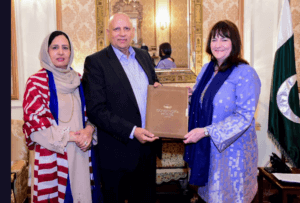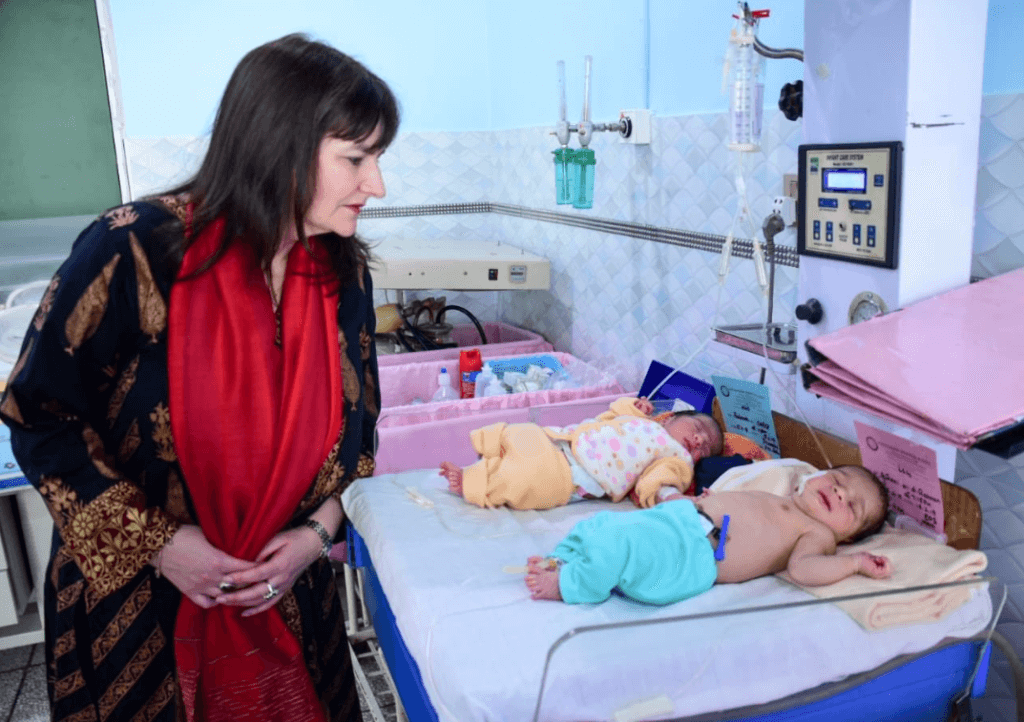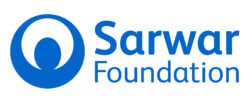By Suzan King
I went to Pakistan in February 2019 to visit my friend Perveen Sarwar and to see the charitable work she does as part of the Sarwar Foundation.

Before I went to Pakistan, I had an idea of the work the Foundation did as Perveen and I had often spoken about it. But I was honestly blown away by the scale and level of work they are doing. I could see every day I was in Pakistan how people’s lives were being changed for the better because of the work of the Foundation.
In my opinion the best charities are those that get to the route of the problem and work to try and alleviate the issues not just use a sticking plaster. That’s what I witnessed.
Health is obviously so important, what impressed me is the fact that not only has the Foundation built two hospitals, it is also trying to improve the health of the population.
In Rajana I visited the hospital built in 2006, this is currently being renovated, section by section so that the renovations do not adversely affect the running of the hospital. The hospital is the only one in the area and is open 24 hours. We were given a tour by Dr Bilal the senior surgeon. His wife is also a doctor working at the hospital and you could not meet two nicer caring people, clearly dedicated to the hospital.
I met a woman who was getting palliative care between cancer treatments as she cannot obtain this where she is receiving her treatment, three premature babies – two that were twins. Before the hospital they would have died as they would simply not have been able to get treatment in time. That’s simply lifesaving.

Hepatitis is a major problem in Pakistan leading to both illness and death. The foundation is undertaking a massive testing of the disease, both in the cities where I witnessed the testing of Women Police cadets and in the villages. There are two mobile testing units which travel to the villages to test people. The units are very well equipped and have a private area for treatment. It is a very simply procedure, a small jab in the thumb. The blood is then tested, and if the person test positive for Hepatitis free medication is provided. To date I understand 11,000 people have been tested.
Here in the UK we are privileged: we turn on a tap when we want water and take clean water for granted. Sadly, that is not the case in Pakistan, where the majority of people do not have access to clean water. This results in illness and death. The implementation of water filtration centres means that clean water is being made available. I visited two – one in the men’s prison in Faisalabad and one in the Police line in Faisalabad and I have to say the water was great, and nicer than the bottled water.
Importantly these filtration centres are also being regularly maintained to ensure that the water remains clean.
I have to be honest when Perveen said we were to visit the Faisalabad Men’s prisons I was not sure what to expect, but I was very impressed by the infrastructure and rehabilitation projects. The Sarwar Foundation has supplied the water filtration plant which is being used to pump water all through the prison. The charity has also supplied medication, medical equipment and the equipment to transform the gardens. Prisoners have planted vegetables and created opens spaces where they can sit with the equipment. I was privileged to plant one of the first trees which will grow there. I also helped to hand out crutches and wheelchairs to prisoners. Being disabled myself I cannot imagine how difficult it must have been for some of those prisoners to survive without such mobility aids. They were laughing at me as I was immediately checking the equipment to see how good it was – I have to say they were of a very high quality.
As we all know education is vital, but sadly about half the children in Pakistan do not go to school. That is another issue the Sarwar Foundation is targeting. In Rajana I visited the Sarwar School set up in 2011. The school has nursery classes and educates both boys and girls up to the age of 16, when it is hoped they will move on to college. The children were great, and I was very impressed that English was being taught in the youngest classes. When I visited one of the older girls’ classes, we asked them what they wanted to do when they left school, and there were four answers: doctors; join the police; become a teacher; and one child said they wanted to become a journalist… that is fantastic.
It was a well-equipped school, with a good library and a computer lab. The lab is also available for use by locals who do not attend the school to develop their PC skills. There is a lot of open space, where the kids can play, and I understand they hope to build an orphanage next door in the future.

One of the main reasons I wanted to visit Pakistan was to see the HunarGahs that Perveen has developed. I believe in equality and the empowerment of women is so important. This is exactly what is being achieved in these HunarGahs or training centres. There are currently around 150 in the Punjab and another 16 in prisons. Currently only about 20% of the workforce in Pakistan is made up of women and that is something the Foundation is striving to change. They teach all ages from very young teenagers upwards.
The HunarGahs train women skills so that they can work, earn and provide for their families. One of the benefits of the younger girls learning a vocation is they can then earn and it stops under-age marriages.
The skills include sewing, dress design, embroidery, jewellery making, hair and beauty courses, computer classes and handicraft. I even saw a woman making the straps to be put on shoes. All the equipment, including the sewing machines were supplied by the Sarwar Foundation. I have a beautiful ring that was made in one of the HunarGahs and given to me. I honestly cannot praise the work I saw enough; the clothes made there were amazing and, believe me, I love my clothes. Very young children can stay with their mothers while they are being taught and older children attend the schools that are run in rooms in the buildings. Other local children are also welcome.
To date more than 5,500 women have been given a skill and are now able to work and earn. Every single person trained in the centres is now working – some have even set up their own businesses with the help and support of the HunarGahs. That is a fantastic achievement and the number will just keep going up.
When we arrived at the HunarGah in Shadrah I could see by the reaction and welcome we received how important this project is to the local people.

The other HunarGah I visited was in the Faisalabad Women’s prison. Again, here the women are being taught vocational courses so that on their release they will have the skills to get a job and hopefully not reoffend, with the equipment being supplied by the Sarwar Foundation. Here they are being taught sewing, embroidery, crafts, hair, beauty and cooking. As we were visiting, the students in the various areas had taken part in a competition, so we had to decide the best food, hair style, henna painting, and sewing. While they are in the prison they are earning money from the skills they have learned which they will have on their release.
What I took away from my trip is that the Sarwar Foundation is making a positive impact on the lives of the people in Pakistan on a daily basis. They are attacking the issues in several ways, trying to reduce the illness and death rate by supplying clean water, and testing for and treating hepatitis. Educating children – both boys and girls – and empowering women, both in the communities and in prisons. I met many people involved with the Foundation and everyone without exception was amazing and dedicated to improving lives.
I can assure you every penny donated to the Sarwar Foundation is being put to good use. Please consider donating here

Mohammed Rajak